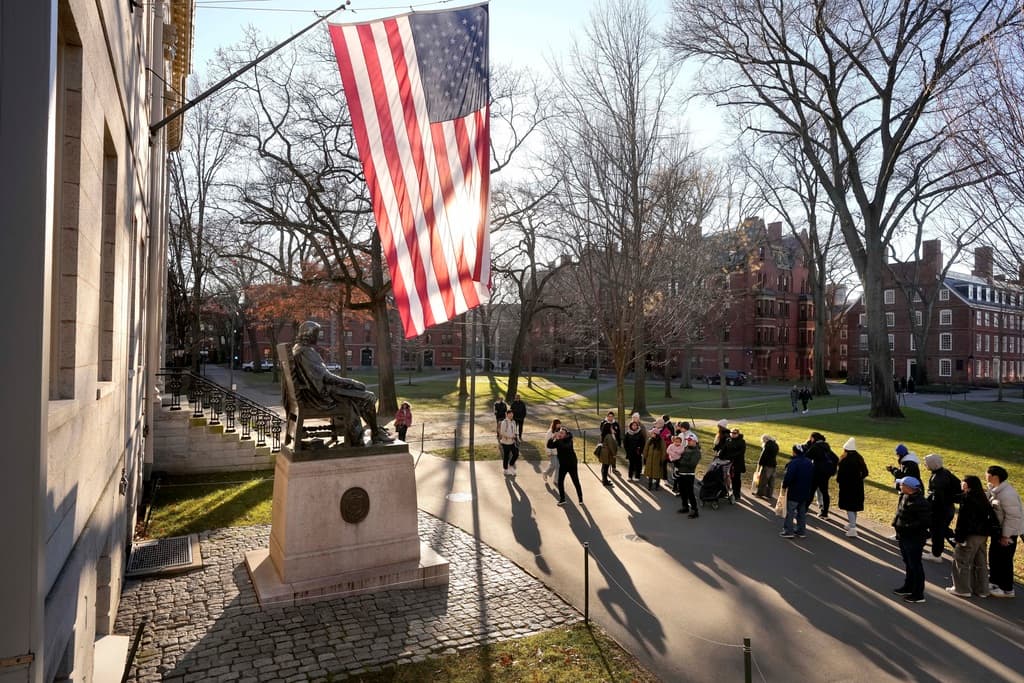Harvard Eyes a ‘No Hot Takes’ Policy To Avoid Wading Into Deeply Divisive Political Issues of the Day
A policy of neutrality could relieve Harvard’s leaders of the criticism they often invite if they do not say the right thing at the right time.

Harvard is considering adopting a policy that would prevent the university from issuing political statements, a dramatic move that could set off a domino effect on other elite campuses.
The nation’s oldest university is eyeing an official policy of institutional neutrality that would put an end to its tendency to weigh in on hot-button issues, a longstanding Harvard professor, Eric Maskin, confirmed in an email to the Sun. Harvard’s president, Alan Garber, soon is expected to announce the creation of a working group that will investigate this issue.
Mr. Garber began his tenure after the university, under the leadership of his predecessor, Claudine Gay, became embroiled in conflict over its response to the Israel-Hamas war. A policy of neutrality could relieve Harvard’s leaders of the pressure to speak out on polarizing issues that do not directly affect the mission of the university — and of the criticism that often ensues if they do not say the right thing at the right time.
There is no doubt other universities are discussing adopting this policy, a former dean of Harvard Medical School, Jeffrey Flier, tells the Sun. “Harvard tends to have a disproportionate impact when it does things or when things are done to it,” Mr. Flier says. “When and if the president of Harvard makes a statement about looking into this and having a task force, that will push many other places to accelerate similar processes.”
An independent faculty group at Harvard on which Mr. Flier serves as co-president, the Council on Academic Freedom, has been discussing the policy for months, he says. He points to “the Harvard double standard” — the idea that diversity, equity, and inclusion protections serve some groups and not others, including Jews and Israelis. “At least for this brief moment in time, there is an interest in doing away with the double standard as best as possible.”
Institutional neutrality was adopted by the University of North Carolina System in 2023 and by the University of Wyoming in 2022. Vanderbilt University has had a longstanding commitment to the policy, which takes inspiration from the Kalven report released by the University of Chicago amid the turbulence of the 1960s.
That policy urges universities to “maintain an independence from political fashions, passions, and pressures.” It noted that dissent should be voiced by individual faculty members or students, for “the university is the home and sponsor of critics; it is not itself the critic.”
Expanding institutional neutrality to universities across the country has been the guiding mission of the nonprofit organization Heterodox Academy, which says institutional leaders should only take official stands “when a public issue arises that directly affects the mission of this college or university.” The rise of antisemitism and Islamophobia on Harvard’s campus since Hamas’s attacks on October 7 would likely fall under the purview of this exception to nonintervention.
“There is no need for Harvard to comment on current events — Harvard is an institution devoted to education and research, not politics,” Mr. Maskin, the Harvard professor, tells the Sun. Pro-Israel or pro-Palestinian statements, he says, abridge the freedom of individuals at the institution who may disagree with the school’s position. “If they speak up, they are being placed in opposition to their own institution,” he says.
Harvard presidents have personally congratulated President Biden on his election in 2020 and mourned the election of President Trump in 2016. For students, challenging this political sway often means challenging their professors, too. More than 75 percent of faculty surveyed by the Crimson in 2023 self-report that they are liberal or very liberal, and only a quarter support increasing ideological diversity by hiring more conservative-leaning professors.
Yet Mr. Flier says the discussion of the policy should not focus on the political imbalance amongst the faculty. For it is “not simply an issue of liberal versus conservative,” but of making speech protections content-neutral across the board.
While universities come under scrutiny by Congress and the Department of Education for antisemitism on campus, institutional leaders might not want to be subjected to word-by-word examinations of their stances. “Inevitably, some people will think the president’s statement is too strong, too weak, too late, or wrong-headed,” Mr. Maskin says. “All the fuss prevents the president from executing his/her proper task, which is to administer the university.”
Yet Harvard cannot be truly neutral, a Harvard professor, Alison Frank Johnson, tells the Sun. “As a wealthy institution whose alumni occupy some of the most powerful positions in U.S. government, the judiciary, and the economy, Harvard is deeply invested in the status quo.” Harvard is not neutral, say, on matters of domestic policy that affects its students’ ability to study and live on campus.
Ms. Johnson endorses what she calls a “no hot takes” policy, so long as the central administration does not preclude individual departments, institutes, or centers from making statements at their own discretion. “What we want is to ensure that more opinions can be aired, tested, and discussed,” she says, “not that fewer are allowed.”

